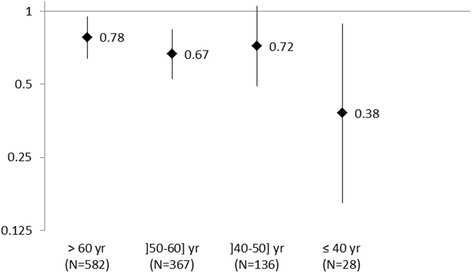Metabolic syndrome and prostate cancer risk in a population-based case-control study in Montreal, Canada
- PMID: 26385727
- PMCID: PMC4574395
- DOI: 10.1186/s12889-015-2260-x
Metabolic syndrome and prostate cancer risk in a population-based case-control study in Montreal, Canada
Abstract
Background: The role of metabolic syndrome (MetS) in prostate cancer risk is still debated. We investigated it in a large population-based case-control study.
Methods: Cases were 1937 men with incident prostate cancer, aged ≤ 75 years, diagnosed across French hospitals in the Montreal area between 2005 and 2009. Concurrently, 1995 population controls from the same residential area and age distribution were randomly selected from electoral list of French-speaking men. Detailed lifestyle and medical histories, and anthropometric measures, were collected during in-person interviews. Prevalence of MetS components (type 2 diabetes, high blood pressure, dyslipidemia and abdominal obesity) was estimated at 2 years before diagnosis for cases/ interview for controls, and at ages 20, 40, 50 and 60. Logistic regression was used to estimate odds ratios (OR) and 95 % confidence intervals for the association between MetS and prostate cancer risk.
Results: A history of MetS (≥ 3 components vs < 3) was associated with a reduced risk of prostate cancer (OR = 0.70 [0.60, 0.82]) after considering potential confounders. The negative association was particularly pronounced with a young age (≤ 40 years) at MetS onset (OR = 0.38 [0.16-0.89]), did not vary according to prostate cancer aggressiveness, and was only partly explained by the presence of type 2 diabetes. A risk decrease was observed with the number of MetS components, suggesting a synergistic interaction of the components.
Discussion: The observed negative association, consistent with results from other North American populations undergoing regular prostate cancer screening, underlines the importance of considering PSA-testing when studying the MetS-prostate cancer association.
Conclusions: Findings from this study are consistent with an inverse association between MetS and prostate cancer risk.
Figures


References
-
- Globocan 2012 [http://globocan.iarc.fr/].
-
- Haenszel W, Kurihara M. Studies of Japanese migrants. I. Mortality from cancer and other diseases among Japanese in the United States. J Natl Cancer Inst. 1968;40:43–68. - PubMed
-
- Platz EA, Giovannucci E: Prostate cancer. In Cancer epidemiology and prevention. 3rd edition. Eastbourne, UK; W.B. Saunders Co; 2006;59 :1128–50.
Publication types
MeSH terms
LinkOut - more resources
Full Text Sources
Other Literature Sources
Medical
Research Materials
Miscellaneous

